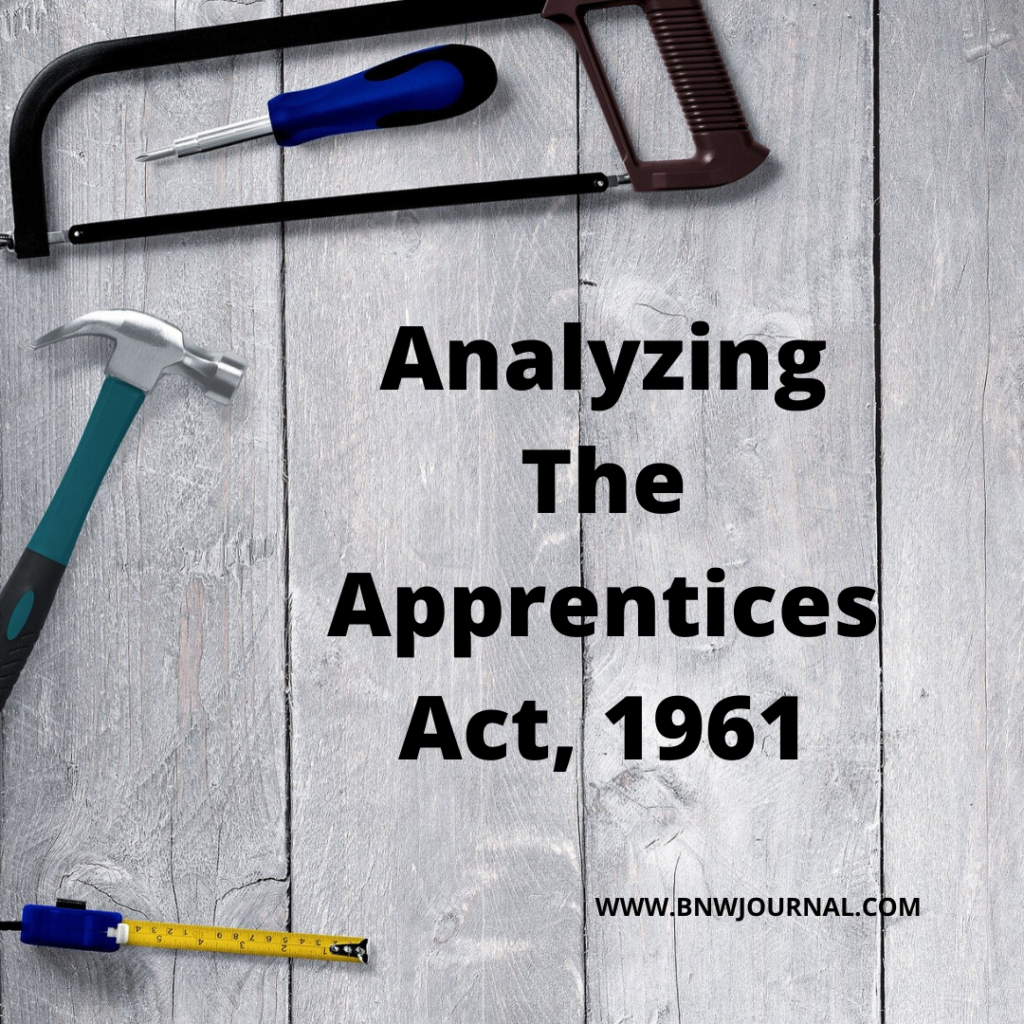![]()
Introduction
The Apprentices Act was presented before the Parliament in the year 1961 and it came in force in the year 1963. The Act was eventually amended in the year 1973, 1986, and most recently in the year 2014.

The Tamil Nadu High Court held that the Apprentices Act, 1961 was enacted to regulate and control of training of all apprenticeship. Thus, the main purpose of the Act is to provide practical training to technically qualified persons in various trades, promoting new skilled man-power.
With the new flagship program of Skill India of the new Indian government, the Act got added importance in the recent past.
However, the Act does not include Special Apprenticeship Training Programmes of the Government unless notified by the Official Gazette. Therefore, the so-called “internships” do not fall under this Act.
Industries falling under this Act
The provision applies to those industries or trades that have been notified by the Central Government in the Official Gazette and the date from which the application would commence would be as per the stipulations of those particular notifications. The Central Government has included almost all the industries under this Act by the publication of notification by the Official Gazette from time to time.
In pursuance of Section 4(a) of the Act, the Central Government has specified the following industries to which the provisions of the Act will affect:
- Agricultural production
- Plantations
- Raising of livestock
- Forestry and logging
- Fishing (including collection of sea products)
- Mining of coal lignite: extraction of peat
- Extraction of crude petroleum: production of natural gas
- Mining of iron ore
- Mining of metal ores other than iron ore
- Also Mining of uranium and thorium ores
- Mining of non-metallic minerals not elsewhere classified
- Manufacture of food products
- Manufacture of beverages, tobacco, and related products
- Also Manufacture of cotton textiles
- Manufacture of wool, silk, and man-made fiber textiles
- Manufacture of jute and other vegetable fiber textiles (except cotton and coir)
- And manufacture of textile products (including wearing apparel)
- Manufacturing wood and wood products, furniture and fixtures
- Manufacture of paper and paper products and printing, publishing and allied industries
- Manufacture of leather and products of leathers, fur, and substitutes of leather
- Plus Manufacture of basic chemicals & chemical products (except products of petroleum and coal)
- Manufacture of rubber, plastic, petroleum and coal products processing of nuclear fuel
- Manufacture of non-metallic mineral products
- Basic metal and alloy industries
- Manufacture of metal products & parts, except machinery and equipment
- Manufacture of machinery and equipment other than transport equipment
- Also Manufacture of transport equipment and parts
- Repair of capital goods
- Electricity generation, transmission and distribution
- Gas and steam generation and distribution through pipes
- Waterworks and supply
- Non-conventional energy generation and distribution
- Construction
- Activities allied to construction
- Wholesale trade in wood, paper, skin, leather and fur, fuel, petroleum, chemicals, perfumery, ceramics, glass and ores, and metals
- Wholesale trade in all types of machinery equipment including transport equipment
- And Wholesale trade not elsewhere classified
- Retail trade in textiles
- Retail trade not elsewhere classified
- Restaurants and hotels
- Land transport
- Water transport
- Air transport
- Storage and warehousing services
- Communication services
- Banking activities, including financial services
- Provident and insurance services
- Real estate activities
- Business services not elsewhere classified
- Public administration and defense services
- Sanitary services
- Education, scientific and research services
- Community services
- Recreational and cultural services
- Personal services
- Repair services
- Persons without any affiliation to any particular industry(including fresh entrants to the labor force)
Apprentice
According to Section 2(aa), an apprentice means “a person who is undergoing apprenticeship training in pursuance of a contract of apprenticeship”. In simple words an apprentice is a person who undergoes training under an employer to learn the skills and crafts of a particular trade.
Section 3 of the Act lays down the basic requirements of an apprentice. An apprentice should not be of the age below 14 and should satisfactorily meet the educational and physical fitness level required in that particular trade (which is different in different trades).
However, in the Apprentices (Amendment) Bill, 2014, the minimum age of an apprentice was increased to 18 for trades related to hazardous industries.
Apprentice Training
“Apprentice training” as defined in Section 2(aaa) is “a course of training in any industry or establishment undergone in pursuance of a contract of apprenticeship and under prescribed terms and conditions which may be different for different categories of apprentices”
According to Section 4 of the Act, a person shall be engaged in a particular trade if he has entered into a contract of apprentice with the employer and if a minor, a guardian on behalf of the minor. Each such contract will contain terms and conditions agreed by both the parties and terms and conditions should be in compliance with varying terms and conditions of the apprentice training for different trade laid down by the Central Government after consulting the Central Apprentice Council.
The contract of apprentice after proper execution will have to be registered by the Apprentice Advisor within the prescribed time.
The apprentices’ contract falls under two categories:
- Trade apprentices
- Graduate, Technician, and Technician (Vocational) Apprentices.
Reservation in Apprentice Training
The employer shall reserve in his training place for the Scheduled Castes and Scheduled Tribes (as described in Article 366 of the Indian Constitution), in accordance with the ratio of the total number of trainees.
Period of training:
The period of training of the apprentice will be determined in the contract in compliance with the Apprentices Act, 1961 and Apprentices Rule, 1962.
| QUALIFICATION | AUTHORITY TO DETERMINE PERIOD OF TRAINING | PERIOD OF TRAINING |
| Trade apprentices have undergone institutional training in a school or other institution recognized by the National Council have passed the trade tests or examinations conducted by that Council or institution recognized by the Council | That particular National Council | As determined by the National Council. |
| Trade apprentices who have undergone institutional training in a school or other institution affiliated to or recognized by a Board or State Council of Technical Education or any other authority which the Central Government may, by notification in the official gazette specify in this behalf, have passed the trade tests or examinations conducted by that Board or State Council or authority. | That Board or State Council or authority | As determined by the Board or State Council or authority |
| Other than trade apprentices | Determined by the Apprentices Rules, 1962 | 6 months (Probation period) |
| Engineering Graduates, Diploma holders and Vocational Certificate | Determined by the Apprentices Rules, 1962 | 1 year |
Tests of the apprentices:
- Trade Apprentices appointed by the National Council, who have completed shall undergo a test to determine the proficiency of the apprentice and shall be provided a certificate of proficiency on passing the test by the National Council.
- Trade Apprentices appointed by the State Council, who have completed shall undergo a test to determine the proficiency of the apprentice and shall be provided a certificate of proficiency on passing the test by the State Council.
- Graduate or Technician or Technical (Vocational) Apprentice appointed by Regional Board who has completed the apprentice training to the satisfaction of the Regional Board shall be provided with the certificate of proficiency.
- Any other graduate, the employer will from time to time determine the proficiency of the apprentices.
Extension of apprentices training period:
| APPRENTICES | CAUSE OF NOT COMPLETING THE TRAINING | AUTHORITY TO DETERMINE EXTENSION OF TRAINING | PERIOD OF EXTENSION OF TRAINING |
| Trade Apprentices who passed the technical tests held by the National Council or State Council | Unable to complete the training period or to take the final test owing to illness or other circumstances beyond his control | Establishment with consultation of Apprenticeship Advisor | Extend the period of his apprenticeship until he completes the full apprenticeship course and the next test is held if so required by the Apprenticeship Adviser |
| Trade Apprentices who passed the technical tests held by the National Council or State Council | Failed in the final test | Establishment with consultation of Apprenticeship Advisor | Extend the period of his apprenticeship until he completes the full apprenticeship course and the next test is held if so required by the Apprenticeship Adviser. However, if the apprentice fails in the 2nd test also, the period of apprenticeship shall not be extended. |
| Trade Apprentices who passed the technical tests held by the National Council or State Council | Unable to complete the period of apprenticeship training due to strike or lockout or layoff in an establishment | Establishment according to Apprentice Rules, 1962 | The period of his apprenticeship training shall be extended for a period equal to the period of strike or lockout or layoff or maximum period of 6 months whichever is less |
| Graduate/Technician/Technician (Vocational) Apprentice | Unable to complete the period of apprenticeship training due to strike or lockout or layoff in an establishment | Establishment according to Apprentice Rules, 1962 | The period of his apprenticeship training shall be extended for a period equal to the period of strike or lockout or layoff or maximum period of 6 months whichever is less |
Termination of apprenticeship contract:
The Apprenticeship Contract will be terminated after the period so prescribed in the contract. After the termination, the employer is not ought to offer any employment to the apprentice nor is the apprentice bound to accept any offer of employment unless expressly mentioned in the Apprenticeship Contract. However, in such a case where the offer of employment is expressly mentioned in the contract, both the parties are bound by it. But further, if the remuneration so mentioned in the contract is unreasonable according to the Apprenticeship Advisor, he shall revise the same.
Either party can however terminate the contract by writing an application to Apprentice Advisor and notify the other party by post before the period of apprenticeship ends.
The Apprentice Advisor can terminate the contract by order if he is satisfied that either party or either party have failed to carry out the terms and conditions of the contract and is desirable for the interests of the parties.
If the employer fails to carry out the terms and conditions in the contract and has caused damages to the apprentice, he is bound to compensate for the damages.
Similarly, if the apprentice has failed to carry out the terms and conditions in the contract and has caused damages to the employer, he or his guardian if he is a minor is bound to return all the costs of training to the employer.
The Apprentice Advisor if terminates a contract before the completion of the period of the apprenticeship contract, for the default of the employer, the apprentice if enters into a new apprenticeship contract with some other employer, the Apprentice Advisor can permit to include the number of days of apprentice training with the previous employer be counted with the period of the new apprenticeship contract.
The dispute between the Employer and Apprentice
According to Section 20 of the Act, any dispute between the employer and apprentice will be settled by the Apprenticeship Advisor. Any aggrieved party to the decision of the Apprenticeship Advisor can appeal to the Apprenticeship Council and shall be determined by the Committee of the Council appointed for this purpose.
However, subject to the decision made by the Committee of Council, the decision of the Apprenticeship Advisor will be final.
Compensation on Personal Injury
If the Apprentice has any personal injury caused by accident during the course of his training, the employer is liable to pay compensation as determined by the Workmen’s Compensation Act, 1923.
In the case of factories and mines, provisions the health, safety, and welfare of the Factory’s Act, 1948, and the Mines Act, 1952 shall extend to the apprentice of such factory or mine.
Hours of Work
The daily or the weekly hours and the prescribed holidays shall be as per the discretion or policy of the employer
However, no apprentice shall be appointed to work for extra hours beyond the policy of the employer as in the contract without the approval of the Apprentice Advisor.
Position of the Apprentice
An apprentice is a trainee and not a worker of the establishment, the provisions of any law with respect to any labor like ESI, PF, Industrial Disputes, etc shall not apply to the apprentice.
Payment of the apprentice:
An apprentice shall be given stipend at a rate not less than the prescribed minimum rate by the Central Government or the rate which was being paid by the employer on 1st January 1970 to the category of apprentices under which such apprentice falls, whichever is higher as may be specified in the contract of apprenticeship.
The stipend so specified shall be paid at such intervals and subject to such conditions as may be prescribed.
However, the apprentice is not eligible for payment of any piece of work or any bonus.
Offences and punishments {Section 30, 31, 32}:
| Type of Employer | Offense | Who is Liable | Punishment |
| Employer other than a company | engages as an apprentice a person who is not qualified for being so engaged | EMPLOYER | Fine so determined |
| Employer other than a company | fails to carry out the terms and conditions of a contract of apprenticeship | EMPLOYER | Fine so determined |
| Employer other than a company | contravenes the provisions of this Act relating to the number of apprentices which he is required to engage under those provisions | EMPLOYER | Fine so determined |
| Employer other than a company or any person(including a company) | Was required to furnish any information but have furnished false information or have willfully neglected in furnishing information | EMPLOYER/PERSON/COMPANY | Fine as determined |
| Employer other than a company or any person(including a company) | requires an apprentice to work overtime without the approval of the Apprenticeship Adviser | EMPLOYER/PERSON/COMPANY | Fine as determined |
| Employer other than a company or any person(including a company) | employs an apprentice on any work which is not connected with his training, | EMPLOYER/PERSON/COMPANY | Fine as determined |
| Employer other than a company or any person(including a company) | makes payment to an apprentice on the basis of piece-work, | EMPLOYER/PERSON/COMPANY | Fine as determined |
| Employer other than a company or any person(including a company) | requires an apprentice to take part in any output bonus or incentive scheme | EMPLOYER/PERSON/COMPANY | Fine as determined |
| Company with consent/negligence of any director, manager, secretary, or another officer of the company, such director, manager, secretary, or another officer | ALL THE ABOVE | SUCH DIRECTOR, MANAGER, SECRETARY, OR OTHER OFFICER OF THE COMPANY, SUCH DIRECTOR, MANAGER, SECRETARY, OR OTHER OFFICER | Fine as determined |
MAJOR CHANGES IN APPRENTICES (AMENDMENT) BILL, 2014
- The bill brought an amendment to the definitions of: (i) designated trade, (ii) graduate or technician apprentice, (iii) trade apprentice, (iv) industry, and (v) worker.
- The bill added two new definitions: (i) optional trade, and (ii) portal-site
- Ans the bill adds that the minimum age for apprenticeship in designated trades related to hazardous industries shall be 18 years whereas in all other cases it remains 14.
- Also the bill states that the hours of work and leave will be as per the discretion or policy of the employer which was earlier according to the Act.
- The bill repeals the imprisonment for offenses under this Act and confines it to only fine.
- The number of apprentices to be engage by an employer in a particular trade will be solely decide by the Central Government, which was earlier with the consultation of the Central Apprenticeship Council.



0 Comments